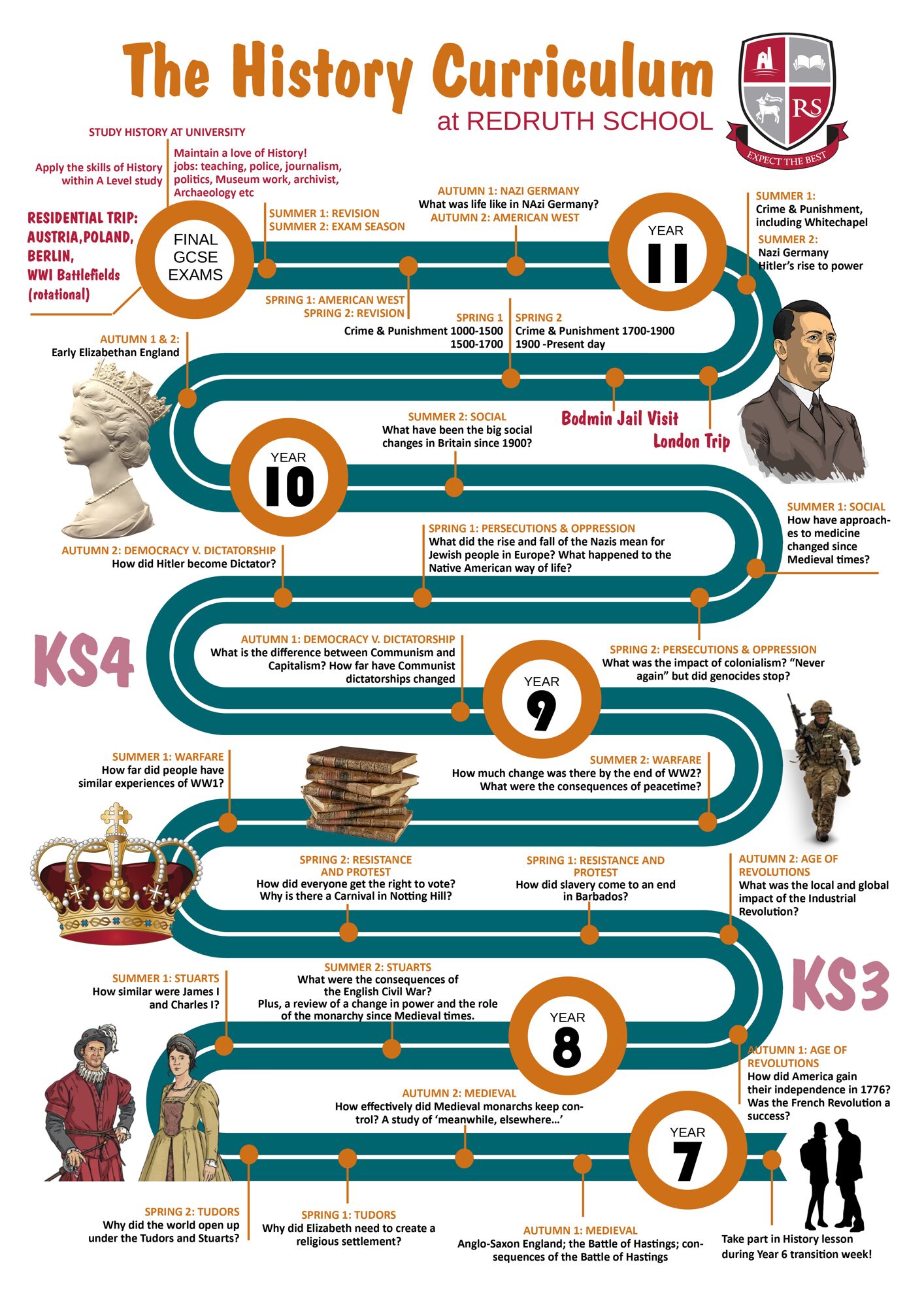- Home
- Students
- Subject Information
- History
- facebookShare this page on Facebook
- twitterTweet this page
- pinterestPin this page
History
Head of Subject: Mrs Amanda Moore
amoore@redruth.cornwall.sch.uk
History curriculum intent
Our intent is to ignite a lifelong interest in the past, across time and place. We want students to understand how history has shaped the world around us, and can offer explanations to current affairs. In history, we cover a range of skills that will prepare them for the future, such as evaluating sources of information and forming a judgement. Our curriculum intends to allow all students to be able to see themselves in history in a positive light. We cover topics in depth and breadth to allow students to study a specific event in detail, but also acquire a breadth of knowledge that allows them to assess change and continuity over a large period of time. Throughout their time at Redruth School, they will study local history across different time periods to see the role that Redruth and Cornwall has played in history. We also offer many opportunities to support our curriculum with building their 'cultural capital'; for example, we run a range of trips to London, Germany, Austria and local trips too.

What does the Key Stage 3 curriculum look like?
In Year 7, we aim to build students' foundations of learning history, and provide a firm chronological understanding. We start with looking at life in Anglo-Saxon England, followed by the Battle of Hastings and the changes that the Norman invasion brought to England. We then look at how far Medieval monarchs kept control, which involves events such as the Magna Carta, and the death of Thomas Becket. We end our first unit with a focus on the rest of the world. We then move on to the Tudors, with a focus on religious changes and the start of exploration. Our last unit is on the Stuarts, starting with a comparison between James and Charles I, then studying the consequences of the English Civil War. We end Year 7 with a review on the changes to the role of the monarchy from Anglo-Saxon times, and how there have been changes to power and authority.
In Year 8, we start with our 'Age of Revolutions' units, looking at the American War of Independence, the French Revolution and the Industrial Revolution. In the Industrial Revolution, we focus on a local study, looking at the impact on Redruth, Cornwall and Bristol, and the global impact. The next unit is 'Resistance and Protest' looking at various examples, such as the fight against slavery, the fight for racial equality in both the UK and USA and the journey toward everyone getting the vote. We finish Year 8 with our 'warfare' unit, which looks at different experiences of World War One, how much changed by the end of World War Two, and the consequences of peacetime.
In Year 9, we start with a unit on 'Democracy v. Dictatorship', starting with the difference between Communism and Capitalism, a study of 20th Century Communist dictatorships and a case study on the rise of Hitler. Following this, we have a unit on 'Persecutions', starting with a case study on the Holocaust, then the destruction of the Native American way of life, and then studying the impact of colonialism across the world. We end Year 9 with a social history unit, which allows students to review all of the time periods studying in a thematic approach, looking at changes to medicine. We then have a depth study on British Social History in the 20th Century, looking at the big social changes in each decade.
What does the Key Stage 4 curriculum look like?
For GCSE History, we teach the Pearson Edexcel GCSE course. The units include:
- Paper 1 – Thematic study and historic environment – Crime and Punishment in Britain c1000-present plus Whitechapel, c1870-c1900: crime, policing and the inner city
- Paper 2 – Period Study (The American West, c1835–c1895) plus British Depth Study (Elizabethan England, 1558-1588)
- Paper 3 – Modern Depth Study – Weimar and Nazi Germany, 1918-39
The skills that are examined are:
- subject knowledge of topics
- explaining a range of reasons why events happened
- explaining why certain events should be regarded as important
- analysing the usefulness of sources; evaluating (weighing up) how much we agree with the interpretations (views) of different historians.
How can you support History learning at home?
You could search out topical films, documentaries and articles to encourage your child’s knowledge and enthusiasm for the topics they will study. The department provides students with examples of what these may be. If you would like one emailing home please contact Mrs Moore.
Specific revision guides are available to purchase on ParentPay and cost £3.00. It makes good sense to begin using these from the beginning of the GCSE studies to enhance and reflect on class work.


